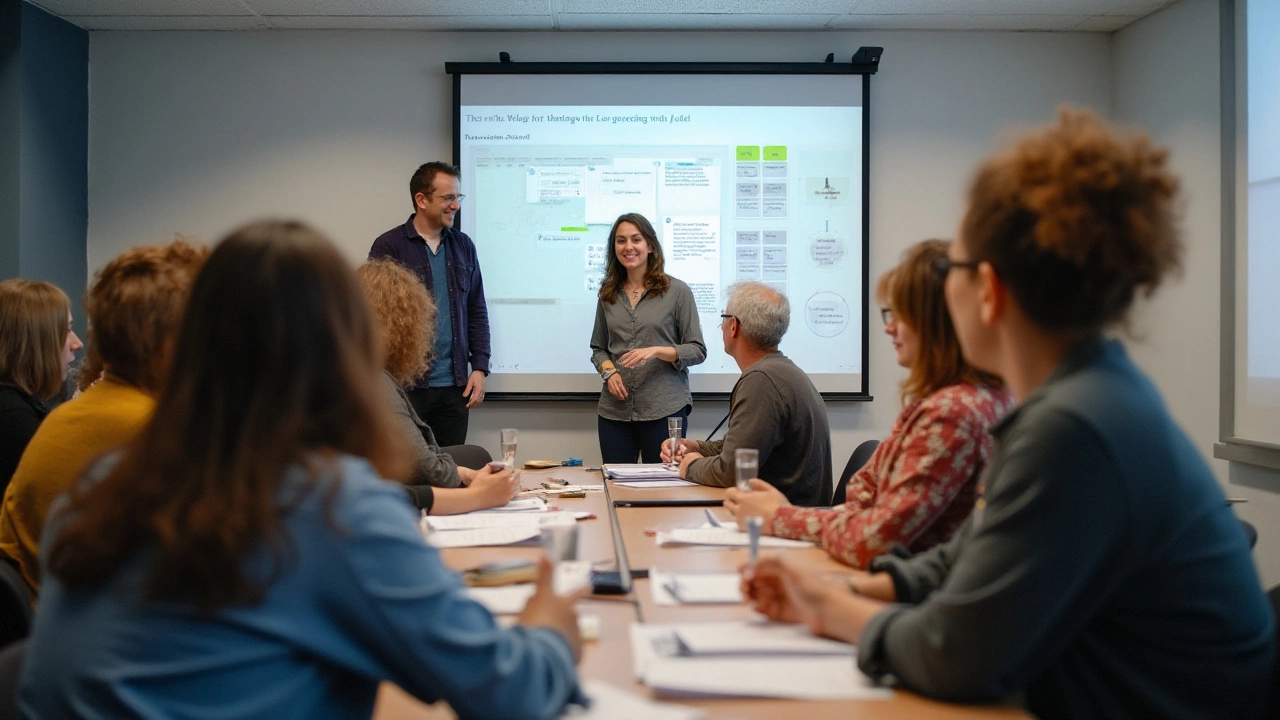Humans are curious creatures, wired to learn from birth. But there's a prevailing belief that picking up new skills or knowledge becomes tougher as we get older. Is there truth in this? It turns out, the answer isn't as straightforward as one might think.
From the amazing concept of neuroplasticity to the unique challenges faced by adult learners, age doesn't so much define our learning capacity as it does shape and color it. Anyone can become a successful lifelong learner by understanding our brains' adaptability, harnessing our natural curiosity, and employing effective techniques to learn.
Join us as we unravel the mysteries of learning as adults, backed by science, heartening insights, and some tried and tested methods to make acquiring new skills an exciting adventure at any stage in life.
- Introduction to Learning and Age
- Neuroplasticity Explained
- Challenges in Adult Learning
- Strategies for Effective Learning
Introduction to Learning and Age
The journey of learning is a lifelong adventure, touching every corner of our lives, from tying shoelaces as children to mastering complex software as adults. There's a belief that, as we cross certain age thresholds, excelling in new areas becomes a steep climb. Yet, this perception often fails to consider the incredible ability of our brains to adapt and change, known as neuroplasticity. Understanding what makes adult learning unique and the challenges that come along with it can change how we approach this stage of learning, opening doors to continuous development and enrichment.
Most of us learn our ABCs during school years, believing that those foundational years are the prime time for education. The reality, however, is that learning doesn't stop at graduation. Scientists have shown that our brains maintain their ability to rewire and adapt well into older age. A pivotal study by the University of London found that taxi drivers developed larger hippocampi, the brain region associated with navigation, after years of experience. Neuroplasticity plays a significant role here, allowing adults to reshape their brains and acquire new skills even later in life.
So why do we assume that learning slows down? Multiple factors — ranging from societal expectations to self-imposed limits — contribute to this notion. One key factor is the stress of adult responsibilities; juggling family, work, and often financial pressures can limit our time and energy for pursuing new knowledge. Nevertheless, by acknowledging and trying to balance these responsibilities, many adults successfully navigate this challenge, often using personal and professional growth as a motivating force.
A British study showed that adults engaging in continued education reported higher satisfaction in various life dimensions, suggesting that lifelong learning is, in fact, beneficial beyond just acquiring new skills. The social interaction and the sheer joy of learning something new contribute to this sense of wellbeing. At any age, the brain craves stimulation, and giving it what it desires brings benefits not just to the individual but to society as a whole.
While we might sometimes feel hesitant to dive into learning as adults, often worried about keeping up with younger peers or technology advancements, it's crucial to see this time of life as full of potential. Paul B. Baltes, a leading figure in the field of human development, said, "The old believe everything; the middle-aged suspect everything; the young know everything." This quote perfectly highlights the benefit of age and experience in learning — with wisdom, we often find better paths for knowledge than youthful impatience. Adult learning adds layers of context and understanding, pushing us forward on a narrative only we can write.
Consequently, let’s embrace learning at any age and remember that, like any skill, the more we practice, the better we become. Whether you're 25 or 85, taking up that long-desired violin lesson or mastering a new software program, the courage to begin is most crucial. Our love of learning makes life richer, full of vibrant colors and endless adventures, whether we've just boarded the learning train or have been traveling for quite some time.

Neuroplasticity Explained
At its core, neuroplasticity is the brain's ability to reorganize itself by forming new neural connections throughout life. This astonishing capacity is the reason why an adult mind can tackle new challenges, learn fresh skills, and even recover from brain injuries. Until a few decades ago, scientists believed the adult brain was a static organ, only decreasing in function as it aged. However, current research paints a different story — one of adaptability and change.
Neuroplasticity has its roots in the brain's neural pathways. Each thought, action, or habit initiates a flow of signals through these pathways. Amazingly, when the existing paths are reinforced or when new ones are created, the brain physically changes. A delightful law of use-it-or-lose-it applies here too. The brain strengthens pathways that are often used and tends to prune away those that aren't. This insight highlights the reason it's possible for adults to continue learning and developing. Whether it's picking up a new language or understanding intricate patterns in music, adults have the powers of lifelong learning at their disposal, thanks to this ability.
Recent studies have underscored that certain activities can bolster neuroplasticity. Physical exercise, for instance, not only improves overall health but also encourages the brain to establish new patterns. Learning new skills and maintaining social interactions are also noted to stimulate brain plasticity. A fascinating aspect to consider is how our emotions interact with these processes. Positive emotions, often nurtured by engaging with something we genuinely enjoy, enhance our brain's ability to adapt. Curiously, a serene mind appears more open to change, while stress can sometimes hinder neuroplastic changes. This provides adults with an insight into creating a conducive learning atmosphere.
Studies and Insights
The modern view of adult education heavily incorporates findings from neuroplasticity research. Dr. Norman Doidge, a renowned figure in the field, once remarked,
"The brain is capable of making new connections, reorganizing itself, and even growing new cells in some circumstances well into old age."This perspective shifts the traditional idea of a static mind. As adults embrace the potential of neuroplasticity, the pathways to enhanced learning are opened, offering hope to those eager to expand their horizons.
The statistics in this area are promising. Consider this simple guide to foster neuroplasticity and learning efficiency. Start with ensuring enough quality sleep, as it's during rest that the brain consolidates memories and forms new neural connections. Follow it up with regular physical activity, which boosts brain function. Lastly, engage in activities that challenge the mind, such as puzzles or learning a new instrument. The more challenging, the better, since tackling complex problems keeps the mind agile.
- Physical Exercise: Vital for promoting new cell growth.
- Quality Sleep: Enhances memory consolidation.
- Mental Challenges: Engages and strengthens neural paths.
The beauty of neuroplasticity lies in its promise that the story of our brain isn't written in stone. By embracing habits and mindsets conducive to brain growth, adults can continue to excel in their learning journeys. It teaches us that age is not a barrier but rather a canvas upon which we can paint new experiences, thoughts, and skills, proving age does not limit the potential to learn and grow.

Challenges in Adult Learning
As we dive into the world of adult education, we see that learning in adulthood presents a unique set of challenges. One of the primary obstacles is competing priorities. Adults often juggle jobs, families, and financial responsibilities, leaving precious little time for focused study. This balancing act can make it tricky to carve out dedicated periods for learning, and unlike school-aged children or college students who typically follow structured timelines, adult learners need to fit their studies around a demanding schedule, making consistency harder to achieve.
The next stumbling block is related to cognitive wear and tear. While our brains remain amazingly adaptable, with the ability to change and form new connections even later in life, the pace at which adults process information tends to slow down with age. This isn't an issue of diminished capacity but rather the need to adjust to our brain's rhythm—which might involve unlearning old ways of thinking. This leads us to another factor: relearning or adaptation. Adults come with entrenched knowledge and experiences that can sometimes lead to rigidity in thinking. Breaking away from established mental patterns to accommodate new concepts can be daunting. As Dr. Norman Doidge has noted, "it's not that the old dog can't learn new tricks, but that the old tricks have made the old dog quite comfortable."
Another challenge is staying motivated. Younger students often have external motivators, like grades and parental expectations, while adults' motivation to learn frequently comes from within. Intrinsic motivation is powerful, but sustaining it requires a strong personal reason—whether it's career advancement, personal fulfillment, or other goals. Then there's the fear of embarrassment or failure, which tends to hang heavier over older learners. Unlike kids, adults have an ingrained sense of pride, and the thought of making mistakes in front of peers can be intimidating. This fear can silently intimidate us from stepping out of our comfort zones and trying new things.
Yet, understanding these challenges can pave the way for solutions tailored to adult learning needs. Strategies like embracing flexible learning paths, fostering a growth mindset, and maintaining clear, personal objectives can greatly enhance learning experiences. Courses designed for adult education often encourage communal projects and group discussions, leveraging the wealth of knowledge adults already have while building new skills. Recognizing that the journey of learning in adulthood is as much about adventure and discovery as it is about acquiring information can transform perceived obstacles into exciting stepping stones. And in places where traditional educational settings might not suffice, online learning platforms provide another layer of accessibility and flexibility.

Strategies for Effective Learning
Embarking on the journey of lifelong learning doesn't have to be daunting, even if you're well past your schooling years. The good news is, our brains are marvelously adaptable, thanks to neuroplasticity. This ability to refine pathways and form new ones provides a foundation to learn, regardless of age. For those diving into new subjects as adults, some strategies can be particularly beneficial.
Firstly, setting specific and realistic goals is crucial. Instead of aiming to 'learn French,' target smaller milestones like 'master 100 French vocabulary words in a month.' This approach not only makes the learning process manageable but also rewarding. Each small achievement fuels motivation, paving the way for greater accomplishments. Another method is active learning, which involves engaging with the material in various ways—through teaching others, discussions, or applying concepts in real life. This interactive approach not only enhances understanding but also retention.
Time management plays a critical role too. For adults balancing work, family, and other commitments, finding dedicated time for learning can be tricky. Creating a schedule that carves out regular, distraction-free study periods can make a world of difference. Consistency turns learning into a habit rather than a chore. Also, using the power of technology can give an adult's learning journey a significant boost. Online courses, educational apps, and digital flashcards make it easier than ever to learn anytime and anywhere. This flexibility can be a game-changer for today's busy learners.
A key aspect is selecting the right environment. A comfortable, well-lit, and organized space reduces distractions and promotes focus. It might also be helpful to incorporate techniques like the Pomodoro Technique; working in intense, focused bursts followed by short breaks can sharpen concentration and prevent burnout. Equally important is to embrace mistakes as part of the process rather than fearing them. Each mistake is an opportunity to learn and improve, which is an invaluable mindset for any learner.
In support of the importance of lifelong learning, Albert Einstein once said:
"Once you stop learning, you start dying."His words resonate with the intrinsic need to evolve and adapt in an ever-changing world. So, whether you're picking up a new hobby or diving into a new field for work, these strategies can ease the path to adult education success, encouraging a lifetime of growth and curiosity.






